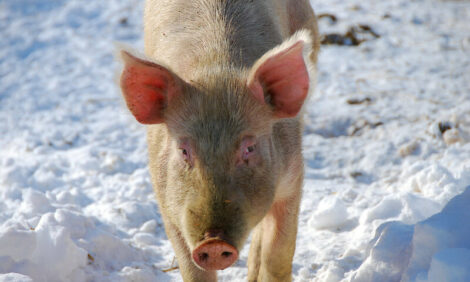



Indonesian pigs test negative for bird flu
INDONESIA - Fresh tests on pigs from Indonesia's Sumatra island, where five people have been confirmed infected with bird flu, did not show any trace of the H5N1 virus, a senior government official said on Friday.![]() Earlier tests by scientists at a leading Indonesian animal research institute had found the pigs in the village where the cluster case occurred were positive for bird flu antibodies.
Earlier tests by scientists at a leading Indonesian animal research institute had found the pigs in the village where the cluster case occurred were positive for bird flu antibodies.
It indicated the animals had once been exposed to the H5N1 bird flu virus, but were not infected any longer. The new nasal swab tests by the centre in Bogor, West Java, were negative for the avian influenza virus.
"Swab tests from the pigs' nose by the Bogor animal research centre came up negative for the virus ... the H5N1 virus," Syamsul Bahri, animal health director at the agriculture ministry, told Reuters.
Bahri said similar swab tests on poultry from the same village were negative for the H5N1 virus, but more tests would be done to confirm the findings.
"We will take the samples to the World Organisation of Animal Health's (OIE) laboratory in Australia for further testing," he said. Pigs can act as mixing vessels in which human and bird flu viruses can swap genes, leading to a strain that can easily infect people and pass from person to person.
The Sumatra cluster case has raised concern about possible human-to-human transmission of the virus. The case involves at least seven family members, six of whom have died and the source of the infection remains unclear. No other members of the village are known to have been infected with bird flu, the World Health Organisation has said but the agency hasn't ruled out limited human-to-human transmission in the family cluster.
Clusters of human infections are worrying because they indicate that the virus might be mutating into a form that is easily transmissible among humans. That, experts say, could spark a pandemic in which millions might die. For the moment, the virus is mainly a disease in birds and is hard for humans to catch. At least 31 people have died of bird flu in Indonesia, the second highest toll of any country. More than half that number have died this year.
Bird flu has spread across Europe, Africa and Asia and has killed 122 people worldwide, the majority in east Asia, since re-appearing in 2003. Virtually all the victims caught the disease from poultry. The H5N1 virus is endemic in much of Indonesia.
ThePigSite News Desk








